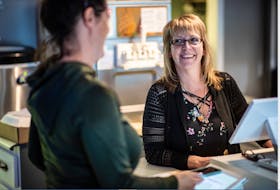In this electronic age households often have more than five electronic devices — and with ever-changing technology the newest devices are replacing outdated ones each year. With all of these devices comes the question: Where do they go when they have reached the end of their useful life? This is where the Electronic Products Recycling Association of Newfoundland and Labrador comes in (EPRA), which is celebrating five years in the province.
Terry Greene, Program Director for EPRA in the province, says since the program began operation in 2013 they have collected and responsibly recycled more than four-and-a-half million kilograms of electronics.
“It’s a lot of material for a small province, but that’s a typical amount across the country. We are in the range of other programs in other provinces, from Nova Scotia to B.C.,” says Greene.
Nationally, Canadians have diverted over one million metric tonnes of electronics, which could have ended up in landfills. Instead of ending up in the dump, these electronics are disassembled and reusable materials are put back into the manufacturing supply chain.
“Most of the materials that are recycled go back into the manufacturing process and are reused in the manufacture of new products. For example, in electronics you are going to find plastics and glass and metals, like copper, gold and silver — all of those things can be extracted from the old electronics and reused in the manufacture of new products,” says Greene.

“We hold special collection events on an annual basis in some communities, it might be some distance from the permanent locations that we have. We do 20 to 25 special collections each year,” says Greene.The EPRA in Newfoundland and Labrador makes it easy to dispose of old electronics responsibly. The organization has a network of recycling facilities that recycle multiple household items, so if you are dropping off used beverage containers, you can often bring your electronics to same drop-off location. There are 52 locations across Newfoundland and Labrador that accept electronics through the EPRA program and they often facilitate collection events for communities across the province.
The list of electronics that EPRA accepts for recycling is long. Cellular and non-cellular telephones, computers, televisions, printers and audio and visual home systems. Greene says it’s important for those looking to recycle their electronics to remove any data that may be stored on devices, such as computers, laptops and cell phones.
“We ask that people remove all of that so that there is no risk of personal data being accessed through the recycling process or even in the transportation,” says Greene. “We do ensure that materials are handled in a responsible and safe manner but we can’t give absolute guarantee to people with respect to leaving data on there.”
By removing your SIM card and data, your personal information will be wiped from the device. Greene recommends contacting device manufacturers if you aren’t sure how to properly remove the data and there are instructions on the EPRA website, at http://www.recycleMYelectronics.ca/NL.
The Newfoundland and Labrador EPRA is looking forward to the next five years of responsibly collecting and recycling electronics from both residents and businesses and expects to continue collecting millions of kilograms of devices from every corner of the province.








